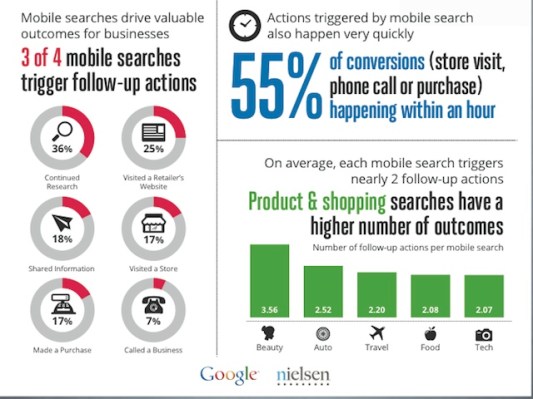Google is releasing the results of a new study conducted with Nielsen on where people conduct mobile searches and what they do after their search. One of the big themes in the report is speed — of all the conversions that happen as a result of a mobile search, 55 percent take place in the first hour.
“We see this immediacy effect with mobile because not only are people potentially closer in physical proximity to a purchase, but they’re also closer to the crucial decision moments,” writes Google Product Marketing Manager Ben Chung in his blog post summarizing the findings.
For example, the study found that 45 percent of mobile searches are conducted to help make a decision. Most mobile searches (77 percent) are actually conducted at home or at work, but they’re purposeful when people are in a store, where two-thirds of searches are conducted to help with a decision.
In terms of what mobile searches are actually prompting people to do, Google found that that three out of four trigger additional actions. Those actions include additional research (36 percent), a website visit (25 percent), a store visit (17 percent), a purchase (17 percent), or a phone call (7 percent).
Jason Spero, head of Google’s mobile sales and strategy, told me that the methodology of the study is also noteworthy. Participants were asked to keep a “search diary” for two weeks, tracking any kind of mobile search. Twenty-four hours or more later, they were then sent questions about the outcomes of those searches. And then there was an exit survey at the end of the study period. In total, Google logged 6,303 searches and collected 1,958 responses about those searches, as well as 323 exit interviews.
This gives Google deeper insight into the real-world outcomes of mobile search, Spero said: “This is a more precise measurement of what had been more gut feel, previously.”
One of the main reasons Google is trying to understand mobile behavior is because it wants to build ad products that take advantage of that behavior, and to explain the value of those products to marketers. Spero argued that looking beyond this specific study, context (such as time and location) is one of the keys to making mobile ads effective.
“We’re very interested in the post-search experience, and we’re looking at that from any number of different angles,” he added. “We’re going to continue to come at this from a lot of different angles because it’s mission critical for us.”
You can download a PDF of the report here.
